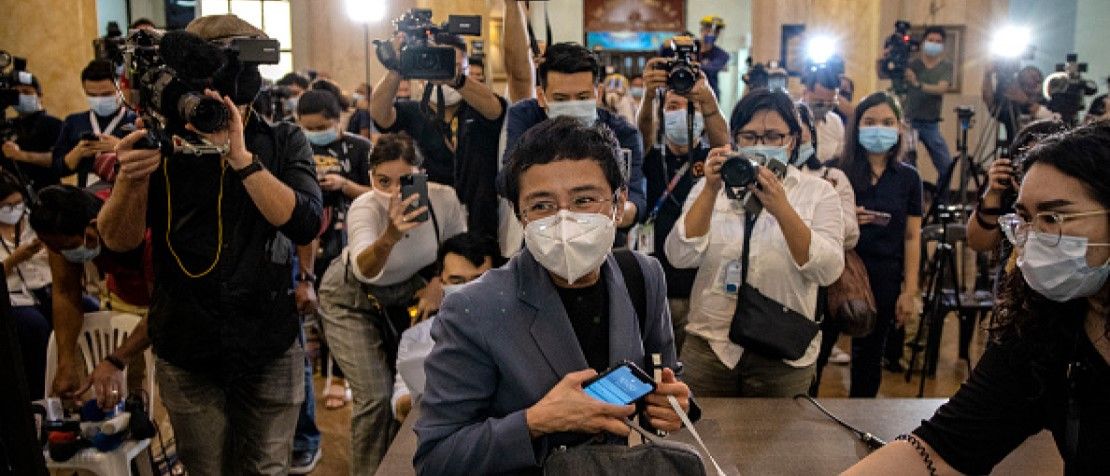
Countering digital disinformation: Maria Ressa wins Nobel Peace Prize
The 2021 Nobel Peace Prize has been awarded to Maria Ressa, founder and CEO of Rappler – a Philippine news website that aims to “speak truth to power” by leveraging journalism, community and technology.
Ressa shares the accolade with Dmitry Andreyevich Muratov, one of the founders and current editor-in-chief of Novaja Gazeta, an independent newspaper in Russia with “a fundamentally critical attitude towards power,” according to the Nobel committee press release.
Both journalists were recognized “for their efforts to safeguard freedom of expression, which is a precondition for democracy and lasting peace.”
Rather than rush to criminalize problematic, but otherwise legal content, Ressa said democracies should consider how existing laws can protect citizens.
“I think we start with taking the laws that already exist in the real world and make sure they’re implemented in the virtual world,” she said last April during a World Summit on Information Society (WSIS) Forum session on countering digital disinformation.
“I think we start with the Universal Declaration of Human Rights.”
Techniques, technology and trolls
Both as a target and debunker of disinformation, Ressa has exposed techniques, technologies and trolls behind disinformation in the Philippines and beyond, while advocating for stronger protections of victims facing death threats, lies and harassment.
When it comes to protecting journalists and consumers online, Ressa argues for systemic solutions. “This isn’t a freedom of speech issue,” she told the WSIS Forum session. “This is about power and money.”
While laws may need to be updated, technology is where more focus is needed, she suggested. “On social media platforms that deliver news, lies laced with anger and hate spread faster and further than facts,” Ressa pointed out.
“Without facts, you can’t have truth; without truth, you can’t have trust; without trust, you can’t do anything. Without trust you break humanity.”
Her views and approach have made the Rappler news platform controversial in her home country.
Hateful attacks on Ressa began in 2016. She recalled receiving “90 hate messages per hour” after publishing a series on the weaponization of the Internet. In June 2020, Ressa was convicted of cyber libel – one of seven active cases against Rappler as of August 2021. Currently out on bail, Ressa has filed an appeal.
A Philippine first
Born in Manila, Maria Ressa is the first Filipino to win the prestigious prize. “I’m speechless,” she said upon hearing the news from Oslo while she was speaking live at another event.
The WSIS Forum session where Ressa took part marked the 30th anniversary of the 1991 Windhoek Declaration for the Development of a Free, Independent and Pluralistic Press.
A 2020 report, commissioned by the United Nations Economic, Scientific and Cultural Organization (UNESCO) on behalf of the ITU/UNESCO Broadband Commission for Sustainable Development, attempts to make sense of the so-called ‘balancing act’ between countering disinformation while respecting freedom of expression.
Other awards
Despite ongoing court cases, Ressa has already been recognized by the international community for her advocacy work.
She is also the laureate of the UNESCO/Guillermo Cano World Press Freedom Prize, which she received on the eve of World Press Freedom Day this year.
In 2018, she was named Time Magazine’s Person of the Year. Ressa thanked the UNESCO award jury for “helping [journalists] shine the light” and giving them energy. “The prize is more a reflection of the way the global community looks at government today – and how much more journalists have to sacrifice to be able to do our jobs.”
View the full recording of the WSIS session Countering digital disinformation while upholding freedom of expression.
Image: Maria Ressa, editor and CEO of Rappler, leaves a regional trial court after being convicted for cyber libel on June 15, 2020 in Manila, Philippines. Photo by Ezra Acayan/Getty Images
